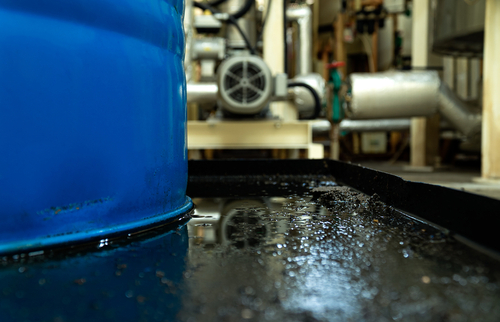Hydraulic Fluid Safety

Figure 1: Hydraulic fluid leak on industrial equipment
Hydraulic fluid is essential to numerous heavy machinery and equipment, providing power and lubrication to various systems. However, hydraulic fluid can pose significant dangers to those working with it despite its crucial role. Understanding these dangers and taking the necessary precautions to stay safe while handling hydraulic fluids is necessary. This article explores the hazards associated with hydraulic fluids and the general guidelines for maintaining these fluids.
Hydraulic fluid hazards
Hydraulic fluid is a mixture of hazardous chemicals. Each individual component of hydraulic fluid needs to be considered hazardous, as some of them can be extremely toxic. The workers maintaining and using the hydraulic equipment are exposed to these toxic fluids through touch, ingestion, injection, and inhalation.
- Exposure to certain hydraulic fluids can result in skin burns or hand weakness when touched, depending on the fluid’s chemical composition. For example, hydraulic fluids containing polychlorinated biphenyls (PCBs) can cause adverse health effects, including skin irritation, liver damage, and developmental problems.
- Injecting or ingesting hydraulic fluids may lead to severe internal burns or poisoning.
- Inhaling harmful fumes produced by the combustion of hydraulic fluid can harm the nervous or respiratory system, causing lung diseases.
Hydraulic fluids can pose risks to people through skin contact during fluid changes and reservoir filling. Even low levels of hydraulic fluids can be present in the air near machines that run on these fluids.
- High temperature: Coming into contact with hydraulic fluid or certain hydraulic components at their normal operating temperatures can result in severe burns. Mostly, hydraulic systems function at 120 - 180 𐩑F(49 - 82.𐩑C). Exposure to liquids at these high temperatures can burn the skin. Also, certain metal parts, like adapters and fittings, are hot and can cause burns.
-
Contamination: Hydraulic fluid contamination is a problem for various reasons.
- When water or moisture contaminates hydraulic fluid, a potentially problematic chemical reaction may occur. This can cause the hydraulic fluid to be corrosive and/or decrease its performance.
- Contamination with dirt, metal particles, and other debris can cause friction in pumps, which can create heat and loss of pressure. An important part of a hydraulic system is consistent pressure. A jack or lift that loses pressure could endanger someone relying on it to keep a heavy object from falling on them.
- Leaks: Not only do leaks present the problem of contamination with water and dirt, but leaks present a problem of directing the force of the liquid to places it doesn't belong. High pressure jets of hydraulic fluid can easily cut soft material (especially skin and clothing). Leaks might also create an aerosol effect that will put toxic vapor in the air or create conditions ideal for combustion. Leaks also result in loss of pressure, which could cause catastrophic results when pressure is lost in places where it is needed.
- Flammable: Hydraulic fluids are flammable and may develop mist or fine spray that can ignite upon contact with a flame, resulting in explosions that could cause serious injury. It is essential to prevent any sources of ignition from coming into contact with hydraulic fluids that are spilled, sprayed, or produced in mist form resulting from any hydraulic system failures. These ignition sources could include open flames, high temperatures, electrical discharges, or sparks resulting from metal-metal contacts. Taking precautions to eliminate ignition sources is critical to avoiding potentially dangerous situations.

Figure 2: Spilled hydraulic fluid
Maintenance
Environmental monitoring of hydraulic fluids can be challenging due to the wide range of ingredients used within these fluids, some of which are also found in other products. For example, mineral oil is present in both motor oil and mineral oil-based hydraulic fluids. The mineral oil from both environments would appear to be the same. Following proper safety procedures and guidelines is essential to stay safe while working with hydraulic fluids.
- Proper training: Ensure all workers who handle hydraulic fluids are adequately trained in the safe handling and storage of hydraulic fluids. Wash hands thoroughly with soap and water to remove the hydraulic fluid. Contact with eyes and other mucous membranes can result in severe irritation and permanent damage. Flush the exposed area with water and follow emergency precautions provided by the manufacturer.
- Personal protective equipment: Wear protective clothing, gloves, approved respirators, and eye protection when handling hydraulic fluids to minimize the risk of skin and eye irritation. In all cases of irritation and injury, seek immediate medical attention.
- Label and store safely: Store hydraulic fluids in labeled, airtight containers in a safe, secure area away from heat and potential ignition sources. Never use hydraulic fluid for anything other than manufacturer recommendations.
- Contamination: Hydraulic fluid poses a high risk to human health and safety; it should be cleaned immediately and disposed of properly using soap and water.
- Monitor and maintain equipment: Regularly inspect equipment that uses hydraulic fluids to ensure it is functioning correctly and minimize the risk of spills and leaks.
- Handling spills: Hydraulic fluid can be very slippery. This can cause slip and fall injuries, skidding out in vehicles, and slippage in brakes. Clean up using spill absorbent or shop rags, taking care to dispose of the waste according to the manufacturer's instructions. In the event of a spill, clean it up immediately using the proper safety procedures and equipment to minimize the risk of exposure to toxic substances.
- Fire hazards: Hydraulic fluid can be exceedingly hot and can result in significant burns. Always permit the hydraulic system to cool down before replacing connections, lines, filters, or fittings. Under pressure and heat, especially around open flames such as welders, hydraulic fluid might ignite. Ensure no open flames, hot shop lights, or IR heaters are close to potentially vaporized hydraulic fluid.
FAQs
Can hydraulic fluid freeze?
Working in extremely cold weather with hydraulic fluid can be hard since the hydraulic fluid freezing point is at about -10° F (-23° C). It is advisable to warm up the engine on the system in advance.
Is hydraulic fluid toxic?
Hydraulic fluids' toxicity varies by type and composition. Some contain heavy metals, carcinogens, or toxic chemicals, posing risks to humans and the environment.
Is hydraulic fluid flammable?
Hydraulic fluid flammability depends on its composition and properties. Some types made with mineral or synthetic oils have low flash points and can ignite under high temperatures or ignition source.





